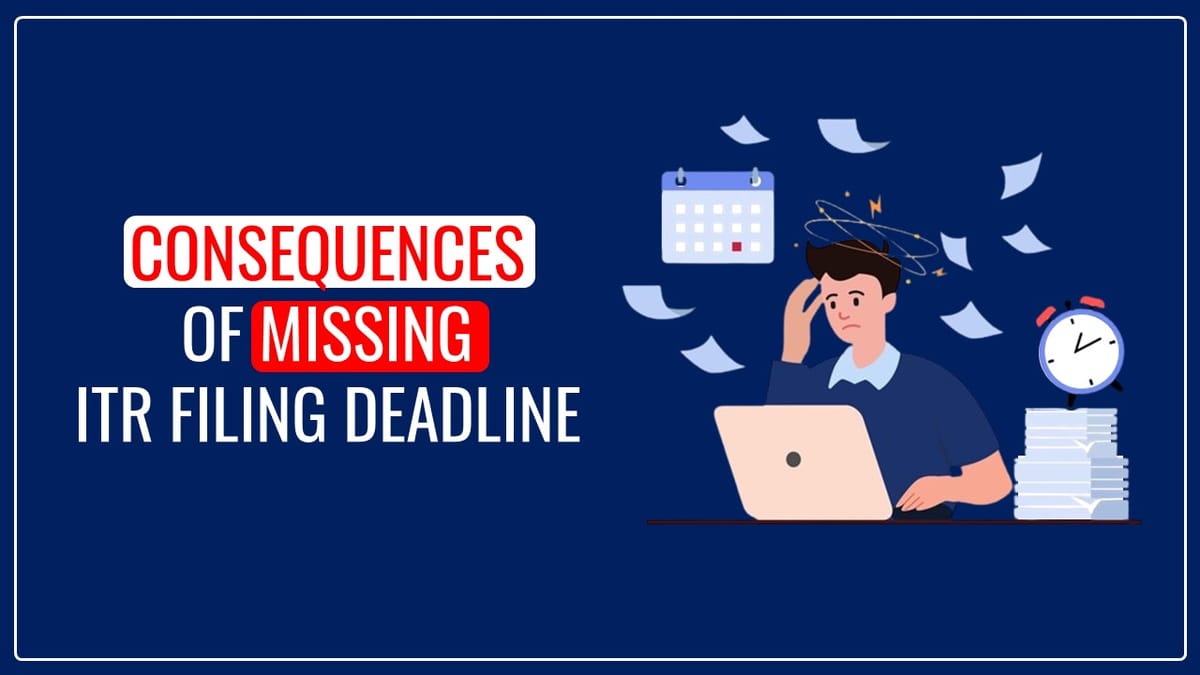Failure to file the ITR by the July 31 deadline, or not filing the return at all by the taxpayers might result in a variety of consequences.
Reetu | Jun 4, 2024 |

ITR Filing: Consequences of not Filing ITR or missing the ITR Filing Deadline
The deadline for filing income tax returns for the financial year 2023-24, or assessment year 2024-25, is July 31, 2024.
Taxpayers are encouraged to submit their returns as soon as possible. Failure to file the ITR by the July 31 deadline, or not filing the return at all, might result in a variety of consequences. Let us explore the likely consequences in depth.
ITR Filing Due Date for Non-Audit/Non-TP Cases: July 31st
If a taxpayer is required to file a return, they must do so by the deadline stated in section 139(1), which is July 31 of the applicable assessment year. Here are the implications of failing to meet the July 31 deadline:
If you miss the July 31 deadline, you can file a belated return until December 31, but there will be a late fee. If the return is filed after the due date indicated in section 139(1), the taxpayer will be required to pay Rs.5,000 in late fees under section 234F. However, if the person’s total income does not exceed Rs.5 lakh, the late filing fee will be reduced to Rs.1,000.
Apart from late fees, if you owe tax, the amount owed will be subject to additional interest u/ 234A until you pay it.
The taxpayer would be required to pay simple interest at the rate of 1% per month or part of a month from the date immediately after the due date, July 31, to the actual return filing date.
Filing income tax returns is the only way to get a refund for excess taxes deducted. Furthermore, taxpayers, like those who owe taxes, are eligible to receive interest on refunds as long as they follow the authorized filing schedule.
From April 1 till the date of a refund, interest is charged at 0.5% every month. Section 244A of the Income-tax Act 1961 states that if the refund is for an excess payment of TDS, TCS, or Advance Tax, the period for interest on refund shall be from the 1st of April of the relevant year to the date of refund granted if the income tax return (ITR) is filed by the due date i.e. 31st July 2024.
However, if the tax return is filed after the due date, the period for interest calculation will be computed from the actual date of filing the tax return to the date of refund.
Hence, if a taxpayer files a belated return after July 31, the interest on the refund will be calculated from the date of filing the return to the date the refund is granted, rather than from April 1.
Aside from the penalties and interest loss, other restrictions are involved with filing a late return. Non-filing of returns by July 31 will also result in the loss of carry forward of losses to subsequent years. It is important to note that only house property losses can be carried forward in the event of late filing.
Aside from interest and other fines, the tax laws provide for further penalties including possible imprisonment if the return is not filed on time and the outstanding tax amount exceeds a particular threshold.
Section 276CC penalizes late filing of income tax returns when the amount of tax payable or evaded exceeds Rs.25,000 with imprisonment ranging from 6 months to 7 years and a fine.
In case of any Doubt regarding Membership you can mail us at [email protected]
Join Studycafe's WhatsApp Group or Telegram Channel for Latest Updates on Government Job, Sarkari Naukri, Private Jobs, Income Tax, GST, Companies Act, Judgements and CA, CS, ICWA, and MUCH MORE!"